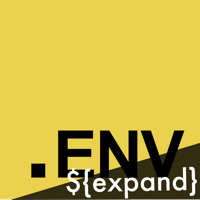Special thanks to our sponsors

dotenv-expand 

Dotenv-expand adds variable expansion on top of dotenv. If you find yourself needing to expand environment variables already existing on your machine, then dotenv-expand is your tool.
Install
# Install locally (recommended)
npm install dotenv-expand --save
Or installing with yarn? yarn add dotenv-expand
Usage
Create a .env file in the root of your project:
PASSWORD="s1mpl3"
DB_PASS=$PASSWORD
As early as possible in your application, import and configure dotenv and then expand dotenv:
const dotenv = require('dotenv')
const dotenvExpand = require('dotenv-expand')
dotenvExpand.expand(dotenv.config())
console.log(process.env) // remove this after you've confirmed it is expanding
That's it. process.env now has the expanded keys and values you defined in your .env file.
dotenvExpand.expand(dotenv.config())
...
connectdb(process.env.DB_PASS)
Preload
Note: Consider using
dotenvxinstead of preloading. I am now doing (and recommending) so.It serves the same purpose (you do not need to require and load dotenv), has built-in expansion support, adds better debugging, and works with ANY language, framework, or platform. – motdotla
You can use the --require (-r) command line option to preload dotenv & dotenv-expand. By doing this, you do not need to require and load dotenv or dotenv-expand in your application code. This is the preferred approach when using import instead of require.
$ node -r dotenv-expand/config your_script.js
The configuration options below are supported as command line arguments in the format dotenv_config_<option>=value
$ node -r dotenv-expand/config your_script.js dotenv_config_path=/custom/path/to/your/env/vars
Additionally, you can use environment variables to set configuration options. Command line arguments will precede these.
$ DOTENV_CONFIG_<OPTION>=value node -r dotenv-expand/config your_script.js
$ DOTENV_CONFIG_ENCODING=latin1 node -r dotenv-expand/config your_script.js dotenv_config_path=/custom/path/to/.env
Examples
See tests/.env.test for simple and complex examples of variable expansion in your .env
file.
Documentation
dotenv-expand exposes one function:
- expand
Expand
expand will expand your environment variables.
const env = {
parsed: {
BASIC: 'basic',
BASIC_EXPAND: '${BASIC}',
BASIC_EXPAND_SIMPLE: '$BASIC'
}
}
console.log(dotenvExpand.expand(env))
Options
processEnv
Default: process.env
Specify an object to write your secrets to. Defaults to process.env environment variables.
const myEnv = {}
const env = {
processEnv: myEnv,
parsed: {
HELLO: 'World'
}
}
dotenvExpand.expand(env)
console.log(myEnv.HELLO) // World
console.log(process.env.HELLO) // undefined
FAQ
What rules does the expansion engine follow?
See a full list of rules here.
How can I avoid expanding pre-existing envs (already in my process.env, for example pas$word)?
As of v12.0.0 dotenv-expand no longer expands process.env.
If you need this ability, use dotenvx by shipping an encrypted .env file with your code - allowing safe expansion at runtime.
How can I override an existing environment variable?
Use dotenvx as dotenv-expand does not support this.
dotenv-expand is a separate module (without knowledge of the loading of process.env and the .env file) and so cannot reliably know what to override.
Contributing Guide
See CONTRIBUTING.md
CHANGELOG
See CHANGELOG.md




